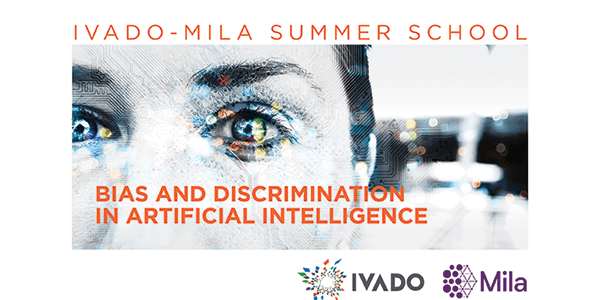
- This event has passed.
IVADO-Mila Summer School on Bias in AI
3 June 2019 @ 08h00 - 6 June 2019 @ 17h00
$200 – $1500Event Navigation

Algorithms, and the data they process, play an increasingly important role in decisions with significant consequences for human welfare. While algorithmic decision-making processes have the potential to lead to fairer and more objective decisions, emerging research suggests that they can also lead to unequal and unfair treatments and outcomes for certain groups or individuals.
This Summer School is an attempt to engage multi-disciplinary teams of researchers and practitioners to explore the social and technical dimensions of bias, discrimination and fairness in machine learning and algorithm design. The course focuses specifically (although not exclusively) on gender, race and socioeconomic based bias and data-driven predictive models leading to decisions.
A basic understanding of machine learning is strongly recommended.
Objectives
- Understanding bias and discrimination
- Exploring the harms from bias in machine learning (discriminatory effects of algorithmic decision-making)
- Identifying the sources of bias and discrimination in machine learning
- Mitigating bias in machine learning (strategies for addressing bias)
- Recommendations to guide the ethical development and evaluation of algorithms
Confirmed Speakers
- Behrouz Babaki, IVADO Post-Doc at Polytechnique Montreal
- Fernando Diaz, Principal Researcher and lead of the Montreal FATE Research Group at Microsoft
- Marc-Antoine Dilhac, Professor of Philosophy at the Université de Montréal, Chair Holder – Canada Research Chair in Public Ethics and Political Theory, Leader of the Montreal Declaration Responsible AI Development Committee
- Luc Faucher, Professor of Philosophy at the Université du Québec à Montréal
- Golnoosh Farnadi, IVADO Post-Doc at Polytechnique Montreal
- Moritz Hardt, Assistant Professor, Department of Electrical Engineering and Computer Sciences at the University of California, Berkeley
- Emre Kiciman, Principal Researcher at Microsoft Research AI
- Margaret Mitchell, Senior Research Scientist, Google Research and Machine Intelligence
- Petra Molnar, Lawyer and Researcher, International Human Rights Program, University of Toronto Faculty of Law
- Deborah Raji, Engineering Science Student at the University of Toronto
- Tania Saba, Professor of Industrial Relations at Université de Montréal, Chair Holder – BMO Diversity and Governance, Université de Montréal
- Pedro Saleiro, Post-doc, Aequitas, Center for Data Science and Public Policy, University of Chicago
- Cynthia Savard Saucier, Director UX at Shopify and author of Author of Tragic Design (O’Reilly)
- Nicolas Vermeys, Professor of Law at the Université de Montréal and Assistant Director of the Cyberjustice Laboratory
- RC Woodmass, Founder of Queerit and Product Designer at Crescendo
- Research Interns at Mila and co-founders of Biasly AI: Andrea Eunbee Jang, Yasmeen Hitti and Carolyne Pelletier
Preliminary Program
Day 1: Bias and inclusion in AI
- Opening remarks
- Keynote and Introduction
- Understanding bias and discrimination
- AI and social justice
- The tech diversity problem
- Introduction to Machine Learning and automated decision-making (optional)
Day 2: Fairness in pre-processing
- Introduction
- Bloc 1: Fairness in pre-processing (fairness in data)
- Technical session
- Case studies
- Hands-on
Day 3: Fairness in processing and post-processing
- Bloc 2: Fairness in processing/Fairness in design
- Technical session
- Case studies
- Bloc 3: Fairness in post-processing/Fairness in decision
- Technical session
- Case studies
Day 4 – Governance, recommendations and future directions
- Community-driven initiatives:
- Montreal Declaration for a Responsible Development of Artificial Intelligence
- Other initiatives (TBD)
- Bias in the private sector: Challenges and recommendations
- Bias in the public sector: Challenges and recommendations
- Closing Panel discussion
Registration
Registration will open on March 11th at 12h00.
- Government and industry employees: $1500
- Non-profit organization (NPO): $400
- Student: $200
IVADO also offers fee waivers to eligible students, which covers the registration fee for the Summer School. To be eligible, please fill the following form available in English or French before March 29, 2019.
Organizing Committee
- Jihane Lamouri, Diversity coordinator, IVADO
- Golnoosh Farnadi, Postdoc researcher, IVADO
- Martin Gibert, Ethics researcher, IVADO
- Brian Moore, Training coordinator, IVADO
Contact
For any inquiries, please contact us at formations@ivado.ca.
